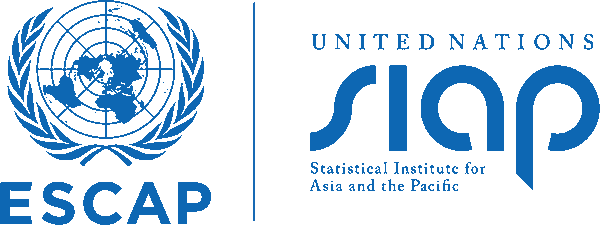
SIAP Statute
The Statute constitutes the basis of SIAP's legal existence, the objectives and functions of the Institute as decided by ESCAP Resolution 50/5 "Status of the Statistical Institute for Asia and the Pacific" and taking into account amendments and revisions since then. The Statute of the Institute was last revised in 2011 pursuant to resolution 67/13 of ESCAP.
Establishment
- The Statistical Institute for Asia and the Pacific (hereinafter referred to as "the Institute"), established in May 1970 as the Asian Statistical Institute, and accorded the legal status of a subsidiary body of the Economic and Social Commission for Asia and the Pacific (hereinafter referred to as "ESCAP" or "the Commission") pursuant to Commission resolutions 50/5 of 13 April 1994 and 51/1 of 1 May 1995, shall continue in existence under the same title and under the terms of the present statute.
- Participation in the training and other activities of the Institute is open to all members and associate members of the Commission.
- The Institute has the status of a subsidiary body of ESCAP.
Objectives
- The objectives of the Institute are to strengthen, through practically oriented training of official statisticians, the capability of the developing members and associate members and economies in transition of the region to collect, analyse and disseminate statistics as well as to produce timely and high-quality statistics that can be utilized for economic and social development planning, and to assist those developing members and associate members and economies in transition in establishing or strengthening their statistical training capability and other related activities.
Functions
- The Institute will achieve the above objectives by undertaking such functions as:
- (a) Training of official statisticians, utilizing existing centres and institutions for training available in member States;
- (b) Networking and partnership with other international organizations and key stakeholders; and
- (c) Dissemination of information.
Status and organization
- The Institute shall have a Governing Council (hereinafter referred to as "the Council"), a Director and staff. ESCAP shall keep separate accounts for the Institute.
- The Institute is located in the Tokyo Metropolitan Area, Japan.
- The activities of the Institute shall be in line with relevant policy decisions adopted by the General Assembly, the Economic and Social Council and the Commission. The Institute shall be subject to the Financial and Staff Regulations and Rules of the United Nations and the applicable administrative instructions.
Governing Council
- The Institute shall have a Governing Council consisting of a representative designated by the Government of Japan and eight representatives nominated by other members and associate members of ESCAP elected by the Commission. The members and associate members to be elected by the Commission shall be elected for a period of three years but shall be eligible for re-election. The Executive Secretary of ESCAP or his/her representative shall attend meetings of the Council.
- The Director of the Institute shall serve as Secretary of the Council.
- Representatives of (a) States that are not members of the Council, (b) United Nations bodies and specialized and related agencies and (c) such other organizations as the Council may deem appropriate, as well as experts in fields of interest to the Council, may be invited by the Executive Secretary to attend meetings of the Council.
- The Council shall meet at least once a year and shall adopt its own rules of procedure. Sessions of the Council shall be convened by the Executive Secretary of ESCAP, who may propose special sessions of the Council at his/her own initiative and shall convene special sessions at the request of a majority of the Council members.
- A quorum for meetings of the Council shall be a majority of its members.
- The nine representatives constituting the Council under paragraph 9 of the present statute shall have one vote each. Decisions and recommendations of the Council shall be made by consensus or, when this is not possible, by a majority of the members present and voting.
- The Council shall, at each regular session, elect a Chairperson and Vice-Chairperson, who shall hold office until the next regular session of the Council. The Chairperson or, in his/her absence, the Vice-Chairperson shall preside at meetings of the Council. If the Chairperson is unable to serve for the full term for which he/she has been elected, the Vice-Chairperson shall act as Chairperson for the remainder of that term.
- The Council shall review the administration and financial status of the Institute and the implementation of its programme of work. The Executive Secretary of ESCAP shall submit an annual report, as adopted by the Council, to the Commission at its annual sessions.
- The Council shall review and endorse annual and long-term workplans consistent with the programme of work.
Director and Staff
- The Institute shall have a Director and staff, who shall be ESCAP staff members appointed under the appropriate United Nations regulations, rules and administrative instructions. The Council will be invited to nominate candidates for the position of Director, once the vacancy is announced, and provide advice, as appropriate. Other members and associate members of the Commission may also submit nominations for the post. The Director and Professional staff shall be appointed for a total term, in principle, not exceeding five years. All appointments shall be for a fixed duration and shall be limited to service with the Institute.
- The Director shall be responsible to the Executive Secretary of ESCAP for the administration of the Institute, the preparation of annual and long-term workplans and the implementation of the programme of work.
Resources of the Institute
- All members and associate members of ESCAP should be encouraged to make a regular annual contribution to the operations of the Institute. The United Nations shall administer a joint contribution trust fund for the Institute, as referred to in paragraph 6, in which these contributions shall be deposited and utilized solely for the activities of the Institute, subject to paragraph 22 of the present statute.
- United Nations bodies and specialized agencies and other entities should also be encouraged to make voluntary contributions to the operations of the Institute. The United Nations shall maintain separate trust funds for voluntary contributions for technical cooperation projects or other extraordinary voluntary contributions for activities of the Institute.
- The financial resources of the Institute shall be administered in accordance with the Financial Regulations and Rules of the United Nations.
Amendments
- Amendments to the present statute shall be adopted by means of a resolution of the Commission.
Matters not covered by the Present Statute
- In the event of any procedural matter arising that is not covered by the present statute or rules of procedure adopted by the Governing Council under paragraph 12 of this statute, the pertinent part of the rules of procedure of the Economic and Social Commission for Asia and the Pacific shall apply.
Entry into force
- The present statute shall enter into force on the date of its adoption by the Commission.

